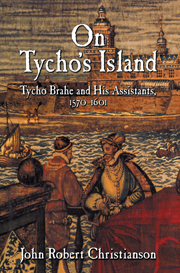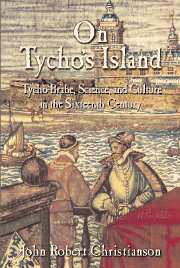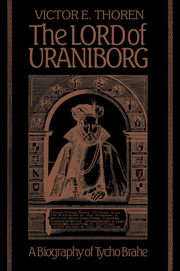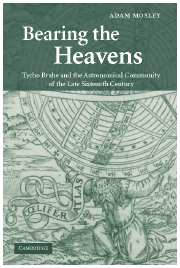On Tycho's Island
Tycho Brahe (1546–1601), the premier patron-practitioner of science in sixteenth-century Europe, established a new role of scientist as administrator, active reformer and natural philosopher. This book explores Brahe's wide range of activities which encompass much more than his reputed role of astronomer. Christianson broadens this singular perspective by portraying Brahe as Platonic philosopher, Paracelsian chemist, Ovidian poet and devoted family man. From his private island in Denmark, Brahe used patronage, printing, friendship, and marriage to incorporate men and women skilled in science, technology and the fine arts into his programme of cosmic reform. This pioneering study includes capsule biographies of over 100 men and women, including Johannes Kepler, Willebrord Snel, Willem Blaeu, several bishops and numerous technical specialists, all of whom helped shape the culture of the Scientific Revolution. Under Tycho Brahe's leadership, their teamwork achieved breakthroughs in astronomy, scientific method and research organization that were essential to the birth of modern science.
- Deep cultural context of early modern science including the contributions of art, architecture, poetry, printing, and public relations to science
- Biographies of over 100 men and women who worked with Tycho Brahe
Reviews & endorsements
"Anyone with an interest in astronomy or the history of science will enjoy this tale, thanks to Christianson's lively style and thorough research." Dan Falk, Toronto Globe & Mail
"...Christianson provides a double share of fascinating insights into one era and the career of perhaps the greatest astronomer of the pre-telescope era. A gold mine for anyone interested in one of the giants of Renaissance science. Kirkus Reviews
"brims with intriguing material." Physics Today
"...explains how Brahe built Uraniborg with labor from Hven's farm village of Tuna; what exalted friendships Brahe established, and what his Latin verse says about that extended familia; how Brahe's complex household, observatory, printing press, map-making projects and chemistry labs operated; and how the Uraniborg group disseminated its methods, ideas and students across northern Europe....Christianson's narrative combines the intrigue of Reformation courts with the excitement of early modern science." Publisher's Weekly
"On Tycho's Island brims with intriguing material...." Physics Today
"A well-rounded portrait of Brahe...is presented in a study which includes intriguing facts on his contemporaries." The Midwest Book Review
On Tycho's Island allows us to appreciate Uraniborg as the site of enormous practical and theoretical advances in astronomy and as a model for many later scientific institutions." Nicholas Jardine, Science
"...Christianson has resotred the noble Dane - idiosyncratic, brilliantly determined, sometimes ruthless, and humanly vulnerable - to his late-sixteenth- century environment. It is worth much more than a sentence, but it must be added that, in addition to the monographic account just sketched, Christianson also offers a great service to scholarship by presenting in the book's second part of a lengthy set of bio-bibliographies for almost all of the principal players." Sixteenth Century Journal
"...Christianson's catalogue provides younger scholars with a treasure chest of nuggets they can use to expand our knowledge of early modern astronomy and its intricate social nexus. I have no doubt that Christianson's book will serve as a reference point for future historians of astronomy." Nature
"...well-written and great fun to read." Annals of Science
Product details
February 2009Paperback
9780521101066
464 pages
229 × 152 × 26 mm
0.68kg
70 b/w illus.
Available
Table of Contents
- Preface
- Part I. On Tycho's Island: Introduction
- 1. In King Frederick's service (1575–1576)
- 2. Junker and peasants (1576–1581)
- 3. Among friends (1570–1576)
- 4. Founding the familia (1576–1584)
- 5. Breakthrough (1584–1587)
- 6. The problem of continuity (1580–1591)
- 7. The school of Europe (1591–1593)
- 8. Magdalene and calumny (1593–1597)
- 9. The Tempest (1597)
- 10. Epilogue: in search of Maecenas (1597–1601)
- 11. Legacy
- Part II. Tycho Brahe's coworkers: Bibliography
- Index.









